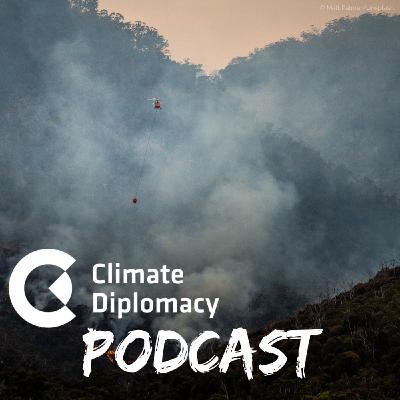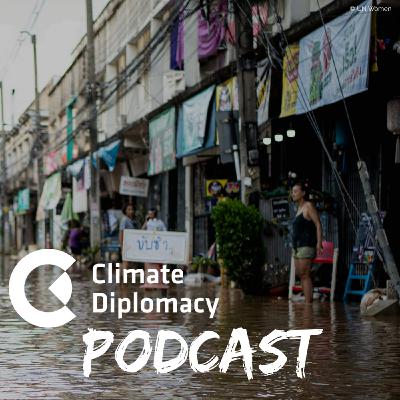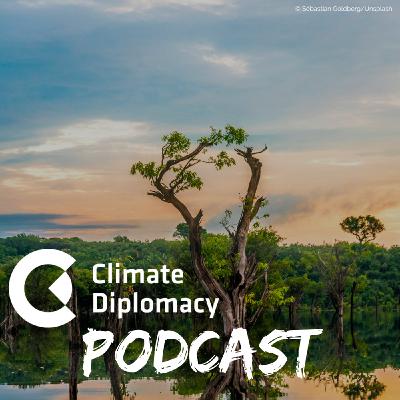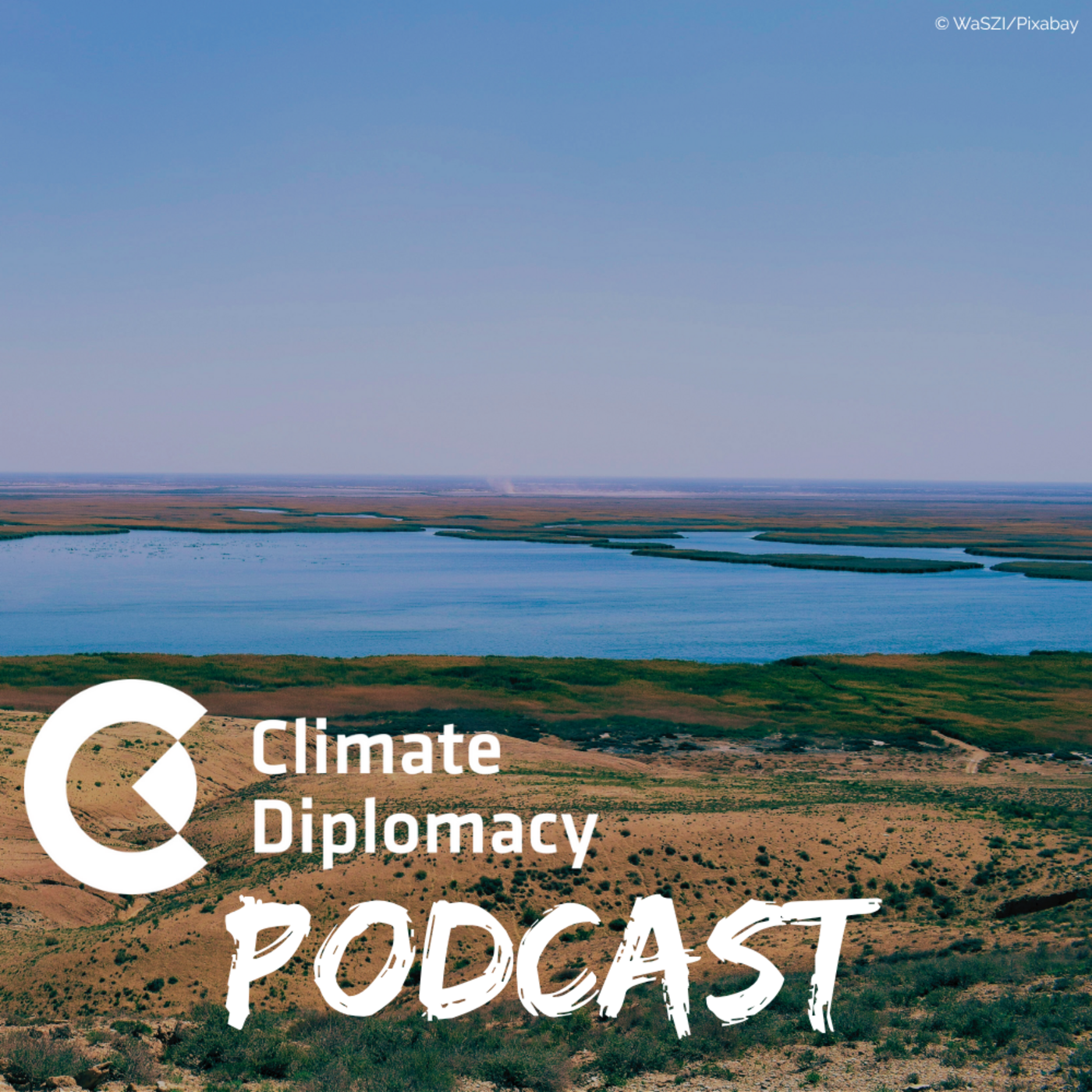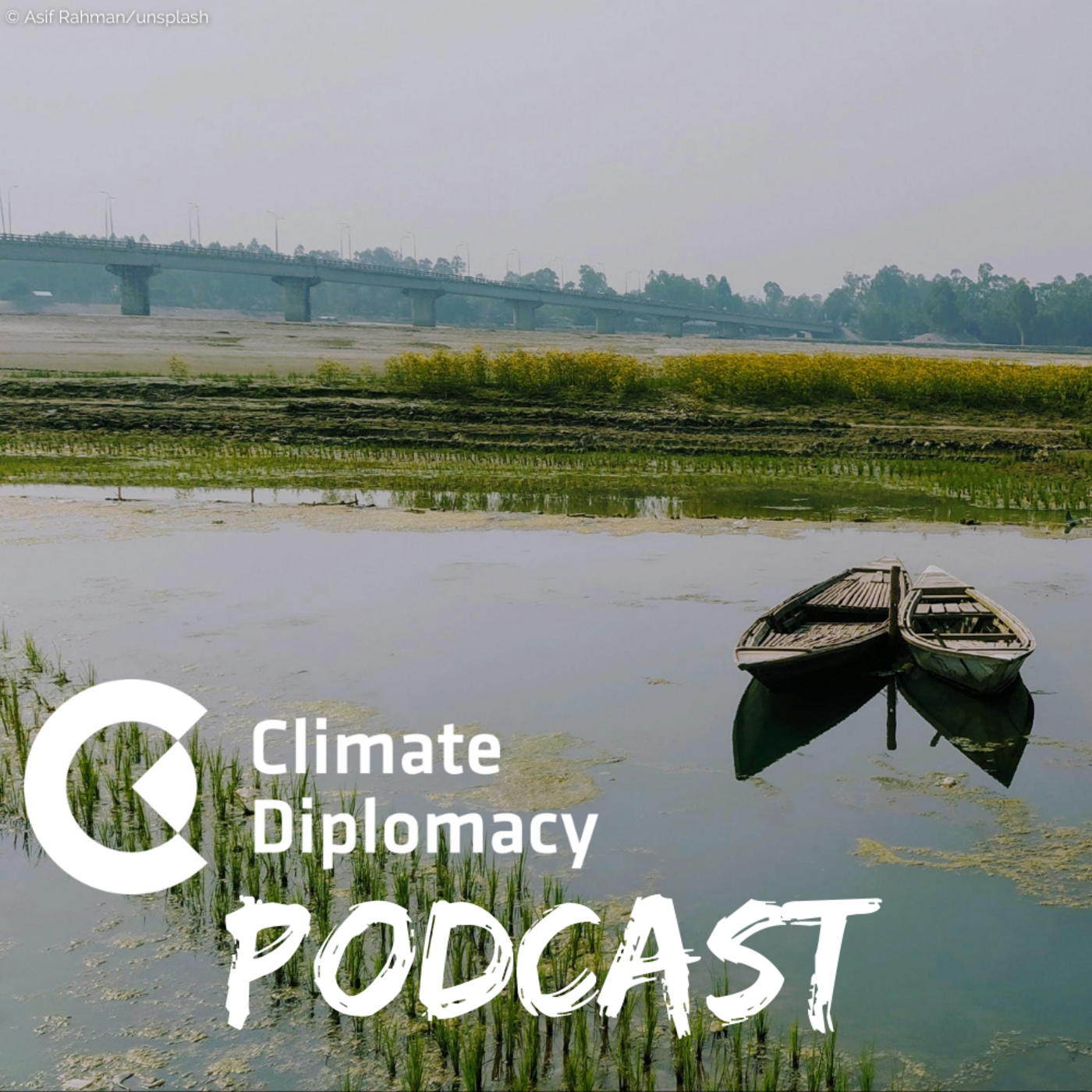Discover Climate Diplomacy Podcast
Climate Diplomacy Podcast

Climate Diplomacy Podcast
Author: Climate Diplomacy
Subscribed: 73Played: 759Subscribe
Share
© Copyright 2025 Climate Diplomacy
Description
The Climate Diplomacy Podcast gives insights into the latest developments in international climate diplomacy and security. Our host Alexandra Steinkraus interviews experts and practitioners on their take on climate foreign policy, climate-related impacts to security, and promoting peace and resilience in a changing climate. Together we look into climate-fragility, migration, food insecurity, gender dynamics and much more, not to mention our deep dive into countries and regions. For more information, please visit climate-diplomacy.org or follow @climatediplo.bsky.social on Bluesky and Climate Diplomacy and Security on LinkedIn.
54 Episodes
Reverse
For the last episode of 2025, we're joined by Jonah Thompson, EU Policy Manager at the Center for Countering Digital Hate, who also works on EU policy at Climate Action Against Disinformation (CAAD). Together, we explore the connection between climate disinformation and security—and how it undermines crisis response, erodes trust and fuels security risks in today's geopolitical climate. Tune in as we unpack the threat landscape, the platform mechanics that amplify harmful narratives, recent examples where misinformation outpaced emergency communications and how climate disinformation attempts to weaken institutions like NATO and the EU. Further reading:Extreme weather: How a storm of false and misleading claims about extreme weather events spread unchecked on social media putting lives as risk (report)The new climate denial: How social media platforms and content producers profit by spreading new forms of climate denial (report)Climate action against disinformation (coalition website)Watch the BCSC 2025 session on climate security and disinformation (video)© adelphi global, all rights reservedadelphi global (https://adelphi-global.de/en) is an economically and politically independent, non-profit organisation dedicated to promoting sustainability, enhancing environmental protection, improving education, expanding development cooperation, and strengthening international collaborations. Our commitment is reflected in targeted projects, in-depth analyses, and informative educational events, through which we strive for a just and sustainable world.Editing by Paulus Müller-Hahl (Lichtbilder)
Marking 25 years of the Women, Peace and Security (WPS) agenda, in collaboration with UN Women, this episode explores how gender-responsive climate action can pave the way to sustainable peace. We are joined by Norul Rashid and Japhet William Graham Eichel from UN Women’s Regional Office for Asia and the Pacific, who share insights from across the region and beyond. Together, they examine how climate impacts intersect with gender norms and security challenges, and why women’s leadership is vital in building resilience. The discussion highlights grassroots initiatives, such as youth-led climate action in Pakistan and women’s mediation efforts in the Pacific and Afghanistan, exploring both the barriers and transformative potential of women’s participation. Listeners will gain a deeper understanding of how the four pillars of the WPS agenda—participation, protection, prevention, and relief and recovery—can address the inseparable challenges of peace and climate resilience.Further reading:
Weathering Two Storms: Gender and Climate in Peace and Security
Gender Responsive Climate Security Assessment for Sri Lanka
Disasters, crises and violence against women: Evidence from big data analysis
© adelphi global, all rights reservedadelphi global (https://adelphi-global.de/en) is an economically and politically independent, non-profit organisation dedicated to promoting sustainability, enhancing environmental protection, improving education, expanding development cooperation, and strengthening international collaborations. Our commitment is reflected in targeted projects, in-depth analyses, and informative educational events, through which we strive for a just and sustainable world.Editing by Paulus Müller-Hahl (Lichtbilder)
In this episode, we explore the critical intersection of climate, environment, and human security in Brazil with Laís Clemente, Analyst in adelphi’s Climate Diplomacy and Security team. As Brazil prepares to host COP30, Laís unpacks the country’s most pressing climate and environmental challenges, from land and water conflicts to environmental crime and extreme weather, and discusses how Brazil’s unique ecosystems like the Amazon and Cerrado shape both risks and opportunities. We examine the strengths and gaps in Brazil’s policy responses, the importance of empowering local and traditional communities, and the country’s evolving leadership role in global climate diplomacy. Further reading: Report: Climate, environment and human security in Brazil: Response landscape and leadership opportunities
In this episode we're joined by Assem Mayar, independent researcher and Climate Security Expert Network member, specialising in climate change, transboundary water management and environmental security. Assem shares insights on challenges and opportunities in Central Asia and Afghanistan, possible solutions in regional initiatives, decentralised finance and innovative funding mechanisms, as well as what the suspension of the Indus Water Treaty means for wider the region going forward. Further resources:Policy Brief No. 221: Afghanistan's Climate Crisis: A Call for Decentralised and Inclusive Finance | The Economic Consequences of Climate Change for Afghanistan: Losses, projections... and pathways to mitigation | Left Behind: Why Afghanistan Cannot Tackle Climate Change Alone | The Indus Water Treaty Suspension: A Wake-Up Call for Asia-Pacific Unity?© adelphi global, all rights reservedadelphi global (https://adelphi-global.de/en) is an economically and politically independent, non-profit organisation dedicated to promoting sustainability, enhancing environmental protection, improving education, expanding development cooperation, and strengthening international collaborations. Our commitment is reflected in targeted projects, in-depth analyses, and informative educational events, through which we strive for a just and sustainable world.Editing by Paulus Müller-Hahl (Lichtbilder)
This month, hosts Alexandra and Raquel celebrate the 50th episode by looking back continent by continent at the countries and regions that have been covered since 2019 on the podcast. From Kazakhstan to Mali to the Caribbean, guests have echoed the need for intersectional and inclusive research and programming, more and better climate finance in fragile and conflict-affected areas and the importance of local expertise and initiatives. Thank you for tuning in month after month over the last 50 episodes! Recommended resources:Climate Security Expert Network © adelphi global, all rights reserved adelphi global (https://adelphi-global.de/en) is an economically and politically independent, non-profit organization dedicated to promoting sustainability, enhancing environmental protection, improving education, expanding development cooperation, and strengthening international collaborations. Our commitment is reflected in targeted projects, in-depth analyses, and informative educational events, through which we strive for a just and sustainable world. Editing by Paulus Müller-Hahl (Lichtbilder).
Crimes against the environment, from illegal deforestation to hazardous waste trafficking, are not just ecological issues—they’re deeply intertwined with climate and security. In this episode, we explore how thesecrimes fuel conflicts, undermine stability, and impact vulnerable communities. Join us and Fabian Keske from the United Nations Office on Drugs and Crime as we uncover the drivers, trends, and entry-points to combat these crimes from the perspective of the climate and security nexus.Related resources:WWF-adelphi joint report "The nature of conflict and peace"
In this episode, we delve into the complexities of fragility in Bangladesh. Our guest for this discussion is Tasnia Khandaker Prova, Lead on Climate Research at the Center for Peace and Justice at BRAC University. We discuss the dynamics of internal and cross-border migration, borderland securitization and the role of community networks in addressing these challenges. As Bangladesh grapples with the repercussions of climate change, especially rising sea levels and increasingly extreme weather events, these pressures serve to compound pre-existing and intersectional vulnerabilities. Tasnia shares insights from her research on Bangladesh's climate-affected borderlands, emphasising the importance of understanding local dynamics and community-led solutions in fostering resilience.Further resources:Fragilities and dispossession in the climate-affected borderlands of southwest Bangladesh (report) |Community-based participatory research (video) | Hearing local voices at the "Ground Zero" of climate change (article) | Berlin Climate and Security Conference session on migration featuring Tasnia (video) © adelphi global, all rights reserved adelphi global (https://adelphi-global.de/en) is an economically and politically independent, non-profit organisation dedicated to promoting sustainability, enhancing environmental protection, improving education, expanding development cooperation, and strengthening international collaborations. Our commitment is reflected in targeted projects, in-depth analyses, and informative educational events, through which we strive for a just and sustainable world. Editing by Paulus Müller-Hahl (Lichtbilder).
In this episode, we explore the complex relationship between conflict and war, climate change and environmental degradation in Yemen with Hisham Al-Omeisy (Senior Yemen Advisor, European Institute of Peace) and Sinéad Barry (Analyst, Climate Diplomacy and Security Programme, adelphi). We discuss the current political situation, how the humanitarian crisis is compounded by environmental degradation and how climate change intensifies key issues related to water and land. With significant cuts to humanitarian aid and changing geopolitical dynamics, funding shortfalls jeopardise long-term peacebuilding efforts, programmes that provide food, water and medical services and economic recovery efforts. This episode underscores the need for innovative funding strategies as well as the importance of integrating environmental considerations into peacebuilding efforts. Further links: Watch Hisham Al-Omeisy brief the UNSC (starting minute 19) | Undercurrents: How conflict, climate change and the environment intersect in Yemen | Environmental Pathways for Reconciliation in Yemen Consultation Report 2024 Learn more about the Weathering Risk Peace Pillar project Environmental pathways for reconciliation in Yemen© adelphi global, all rights reserved adelphi global (https://adelphi-global.de/en) is an economically and politically independent, non-profit organisation dedicated to promoting sustainability, enhancing environmental protection, improving education, expanding development cooperation, and strengthening international collaborations. Our commitment is reflected in targeted projects, in-depth analyses, and informative educational events, through which we strive for a just and sustainable world. Editing by Paulus Müller-Hahl (Lichtbilder).
In this episode, we explore the complex relationship between water, climate change and conflict in Libya. We are joined by independent consultant and researcher and one of the newest members of the Climate Security Expert Network, Malak Altaeb to discuss the reality of water scarcity, the weaponisation of water and the impacts of political legacy and fragmentation on infrastructure and governance. This episode highlights the devastating floods in eastern Libya in September 2023, emphasising the need for sustainable water management and international cooperation. It also underscores the importance of community engagement and long-term vision for water reform and resilience in Libya. Further links: Water Politics in Libya: A Crisis of Management, not Scarcity | What’s next for Libya’s Great Man-Made River Project | From floods to disaster: A conflict- and climate-sensitive recovery pathway for Libya © adelphi global, all rights reserved adelphi global (https://adelphi-global.de/en) is an economically and politically independent, non-profit organisation dedicated to promoting sustainability, enhancing environmental protection, improving education, expanding development cooperation, and strengthening international collaborations. Our commitment is reflected in targeted projects, in-depth analyses, and informative educational events, through which we strive for a just and sustainable world. Editing by Paulus Müller-Hahl (Lichtbilder).
As COP29 in Azerbaijan has come to a close, in this episode, our colleague Yosr Khèdr (Analyst, adelphi) joins the podcast to discuss the climate finance negotiations, the new Collective Quantified Goal on Climate Finance, the shortcomings of the final text and what this means for COP30 in Belém. We also dive into what the negotiations mean for fragile and conflict affected countries, the significance of the second Peace Day and other positive outcomes from this year’s COP. Further links: Climate finance for peace: Event summary | Upscaling peace-positive climate action and climate-informed peacebuilding | Operationalising the Climate, Relief, Recovery and Peace Declaration © adelphi global, all rights reserved adelphi global (https://adelphi-global.de/en) is an economically and politically independent, non-profit organization dedicated to promoting sustainability, enhancing environmental protection, improving education, expanding development cooperation, and strengthening international collaborations. Our commitment is reflected in targeted projects, in-depth analyses, and informative educational events, through which we strive for a just and sustainable world. Editing by Paulus Müller-Hahl (Lichtbilder).
From key takeaways to a look behind the scenes, in this episode we take a deep dive into all things Berlin Climate and Security Conference (BCSC). One of our hosts, Alexandra Steinkraus, switches hats and joins this episode as a guest along with another key member of the organising team, Laís Clemente. They share insights on how the conference is organised and discuss the role of different actors within the climate, peace and security space, why regional editions are so important, how to ensure geographic diversity and inclusion as a central principal of organising the conference - and more. Further links: Watch the BCSC livestreamed sessions | BCSC Event Summary | BCSC-Cali© adelphi global, all rights reserved adelphi global (https://adelphi-global.de/en) is an economically and politically independent, non-profit organization dedicated to promoting sustainability, enhancing environmental protection, improving education, expanding development cooperation, and strengthening international collaborations. Our commitment is reflected in targeted projects, in-depth analyses, and informative educational events, through which we strive for a just and sustainable world. Editing by Paulus Müller-Hahl (Lichtbilder).
Biodiversity COP is around the corner. For the first time, the forum will look into how peace and security issues intersect with nature, and we are here for it. To understand the CBD COP process, how peace and security landed in the global biodiversity agenda, and to what to expect from the upcoming gathering of the community in Cali, we spoke with Florian Titze, Senior Policy Advisor for International Biodiversity Policy at WWF. Tune in to prepare for following the discussions around global biodiversity!Related links:
BCSC-Cali: Berlin Climate and Security Conference 2024 - Cali Edition
Report The Economics of Biodiversity: The Dasgupta Review
Catalogue of Nature-based Solutions for Peace and Security
© adelphi global, all rights reserved adelphi global (https://adelphi-global.de/en) is an economically and politically independent, non-profit organization dedicated to promoting sustainability, enhancing environmental protection, improving education, expanding development cooperation, and strengthening international collaborations. Our commitment is reflected in targeted projects, in-depth analyses, and informative educational events, through which we strive for a just and sustainable world. Editing by Paulus Müller-Hahl (Lichtbilder).
What did you always want to know about climate, peace and security, but didn't know who to ask? In this episode, hosts Alexandra and Raquel address questions sent by you, spanning from meanings and definitions, through methodologies and approaches, to challenges and solutions. They discuss the development of the climate, peace and security narrative, common misconceptions, and practicalities of embbeding CPS considerations into interventions on the ground. Recommended resources:
Climate change and security: a short Q&A
Weathering Risk methodology
The Nature of Conflict and Peace
© adelphi global, all rights reserved adelphi global (https://adelphi-global.de/en) is an economically and politically independent, non-profit organization dedicated to promoting sustainability, enhancing environmental protection, improving education, expanding development cooperation, and strengthening international collaborations. Our commitment is reflected in targeted projects, in-depth analyses, and informative educational events, through which we strive for a just and sustainable world. Editing by Paulus Müller-Hahl (Lichtbilder).
As a heat dome drives record high temperatures for June across the Middle East and North Africa (MENA), we speak with Ali Nasrallah, a green energy policy and climate security expert to discuss how climate change, rising temperatures and water scarcity are disrupting daily life and infrastructure, exacerbating tensions and contributing to new conflicts. We also speak about the energy transition and progress made -from regional leadership with COP27 and COP28- to national legislation and incentives, as well as the importance of prioritising cross-border programming, partnerships and how access to data and visualisation can increase transparency and build trust with different stakeholders. Discover the Climate-Security and Peacebuilding Thematic Review© adelphi global, all rights reserved adelphi global (https://adelphi-global.de/en) is an economically and politically independent, non-profit organization dedicated to promoting sustainability, enhancing environmental protection, improving education, expanding development cooperation, and strengthening international collaborations. Our commitment is reflected in targeted projects, in-depth analyses, and informative educational events, through which we strive for a just and sustainable world. Editing by Paulus Müller-Hahl (Lichtbilder).
In an era of polycrisis, operationalising the humanitarian-development-peace nexus is crucial for finding solutions that create synergies between these areas, rather than looking at them individually. This is specially the case in conflict, fragile and displacement settings. In this episode, we speak with Grazia Pacillo, Senior Scientist and Co-Lead of CGIAR FOCUS Climate Security, about the climate-smart villages project, which tools it offers to avoid maladaptation and produce co-benefits, and the pathways through which it contributes to peace. We also speak about conflict sensitivity throughout the project cycle, the importance of partnerships, and how to build an evidence base for what (doesn't) work in climate security programming.Discover CGIAR'S Climate Security Programming Dashboard for Climate Finance (CSPDxCF).© adelphi global, all rights reserved adelphi global (https://adelphi-global.de/en) is an economically and politically independent, non-profit organization dedicated to promoting sustainability, enhancing environmental protection, improving education, expanding development cooperation, and strengthening international collaborations. Our commitment is reflected in targeted projects, in-depth analyses, and informative educational events, through which we strive for a just and sustainable world. Editing by Paulus Müller-Hahl (Lichtbilder).
Livelihoods are how the necessities of life are secured. They are a determining factor in many contexts around the world. Many livelihoods are dependent on a healthy environment and a stable climate, making them particularly sensitive to climate and environmental crises. At the same time, they are deeply entangled with social and economic dynamics. As a consequence, livelihoods form a key pathway in the climate-security nexus. In this host-to-host deep dive, we get to talk a bit about our how livelihood security features in our own work, a few experiences and findings, as well as key entry points and recommendations that have emerged from our projects and initiatives at adelphi.Further readings:
Climate, Peace and Security Assessment: Mali
Next steps towards an inclusive Climate, Peace and Security Agenda
Weathering Risk methodology
Climate Security Study: Kenya
Pacific Climate Security Assessment Guide
© adelphi research, all rights reserved adelphi research (https://adelphi-research.de/en) is a non-profit independent think tank for environmental and development policy research and analysis. Our mission is to enable transformative change and to create a sustainable future for generations to come.Editing by Paulus Müller-Hahl (Lichtbilder).
Colombia faces multiple challenges - from a complex peacebuilding process after more than 50 years of armed conflict to growing climate change impacts on its natural resources. Disputes over land use and governance have been at the heart of Colombia's struggle, and while everyone has been affected by it, indigenous and Afro-Colombian communities take a particularly high toll. This episode addresses the importance of considering environmental factors in pursuing victim-centred and community-based approaches to transitional and restorative justice. It also discusses lessons from the Colombian case for the international humanitarian justice system. Tune in for compelling insights from regional experts Valeria Patricia Moscoso Urzúa (Justice Rapid Response) and Héctor Morales Muñoz (adelphi).This episode was produced in cooperation with Justice Rapid Response.*The acronym JEP, mentioned several times in this episode, means 'Jurisdicción Especial para la Paz' (=Special Jurisdiction for Peace)Related resources:
Report 'A Dangerous Climate'
Watch explainer on how climate and land issues relates to Colombia's armed conflict (Spanish/English)
© adelphi research, all rights reserved adelphi research (https://adelphi-research.de/en) is a non-profit independent think tank for environmental and development policy research and analysis. Our mission is to enable transformative change and to create a sustainable future for generations to come.Editing by Paulus Müller-Hahl (Lichtbilder).
Haiti is facing a deep security, political and humanitarian crisis and is simultaneously one of the most vulnerable countries in Latin America and the Caribbean to climate change. Rising temperatures and declining rainfall have intensified drought and climate-related storms are growing more intense, causing devastating flooding. By adversely impacting livelihoods, food security, water scarcity and health conditions, climate change is exacerbating the current multifaceted and complex crisis grappling the country.In this episode, we bring together the researchers behind the Roots for Peace report to discuss experiences conducting the study, setting up the Haiti Climate Security Working Group and share with the broader research community, the lessons learnt while doing so. We also take a look at the main pathways of climate and insecurity in Haiti identified in the study, recommendations and next steps. Join us for this insightful conversation with Paule Juneau (UNEP Haiti), Beatrice Mosello (adelphi) and Jessica Hsu (Haiti-based researcher & anthropologist).Discover the "Roots for Peace" report: adelph.it/WRHaiti© adelphi research, all rights reserved adelphi research (https://adelphi-research.de/en) is a non-profit independent think tank for environmental and development policy research and analysis. Our mission is to enable transformative change and to create a sustainable future for generations to come.Editing by Paulus Müller-Hahl (Lichtbilder).
Since 2014, Yemen has been ravaged by civil war. Our guest today - Yemeni journalist, writer and activist Hind Al-Eryani - brings to light how the war is impacting the lives of women, children, LGBTQ+ communities and religious minorities. Hind explains how women's righs have benn deteriorating in Yemen, and the ways in which this affects society as a whole, for example by hindering climate adaptation. We look into the impacts of climate change on resources, particularly water, and how this fed into insecurity dynamics in the lead up to the conflict, and we discuss whether Germany's feminist foreign policy approach can spill over to women affected by climate change in insecurity worldwide.© adelphi research, all rights reserved adelphi research (https://adelphi-research.de/en) is a non-profit independent think tank for environmental and development policy research and analysis. Our mission is to enable transformative change and to create a sustainable future for generations to come.Editing by Paulus Müller-Hahl (Lichtbilder).
So much can be said about how war and conflict disrupt the environment. The effects on human lives are excruciating and long-lived, making environmental protection a priority for human security - even in armed conflicts. On this International Day for Preventing the Exploitation of the Environment in War, we’ve partnered with PAX to put together an episode looking at how rules and recommendations can help protect the environment in armed conflict under international law and create precedents for prevention. Join our guests Wim Zwijnenburg (PAX) and Helen Obregón Gieseken (ICRC) for this exciting conversation.© adelphi research, all rights reserved adelphi research (https://adelphi-research.de/en) is a non-profit independent think tank for environmental and development policy research and analysis. Our mission is to enable transformative change and to create a sustainable future for generations to come.Editing by Paulus Müller-Hahl (Lichtbilder).




